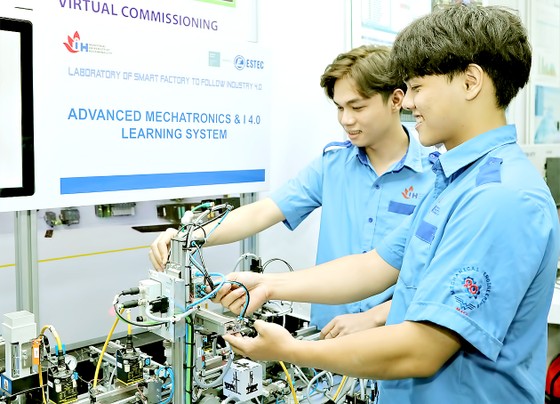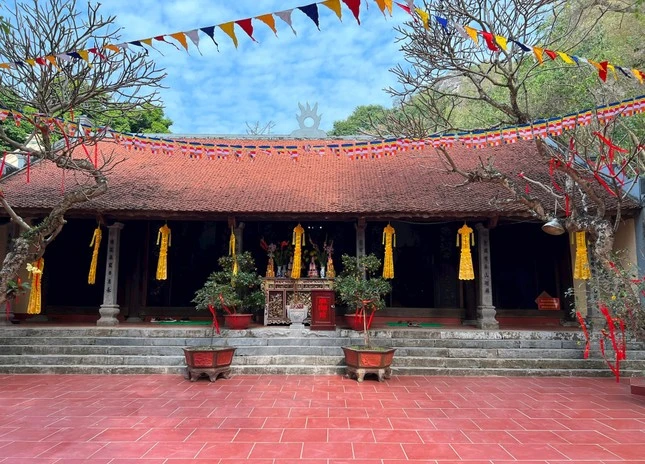SGGP
The Ministry of Education and Training is urgently completing the software system to ensure and assess the quality of higher education. At the same time, in the second quarter of 2023, the Ministry of Education and Training will issue regulations and relevant parties will synchronously implement the declaration of databases to the software system. From there, the determination of each standard and criterion will be faster and more accurate.
 |
| Students of Mechanical Engineering Technology at Ho Chi Minh City University of Industry practice in the laboratory |
Integration with international accreditation
Assessing the quality assessment of higher education in recent times, Associate Professor, Dr. Huynh Van Chuong (Director of the Department of Quality Management - Ministry of Education and Training) commented: Since the promulgation of the Regulation on quality assessment of higher education institutions in 2017, up to now, 87 higher education institutions have been assessed, recognized as meeting educational quality standards and granted educational quality assessment certificates. Currently, no educational institution has had its quality assessment certificate revoked.
It can be generally recognized that after a period of implementation and implementation of the work of ensuring and assessing the quality of education, up to now, most higher education institutions have had a full and correct awareness of the purpose and effects of the work of ensuring and assessing the quality of higher education. The way of implementing the work of ensuring and assessing the quality of higher education in a perfunctory manner has also been greatly reduced.
According to Associate Professor, Dr. Nguyen Huu Duc, former Vice President of Ho Chi Minh City National University, in the past 5 years, quality assessment (at program level and training institution level - school level) has been of interest to schools. Assessment is a matter of survival for higher education institutions. Any institution that does it seriously and builds a culture of quality will have clear changes in improving the quality of training as well as scientific research. This is demonstrated by the fact that many training programs are ranked in the 100-500 best programs in the continent, and some training institutions also appear on prestigious rankings in the world.
Dr. Nguyen Quoc Chinh, Director of the Center for Testing and Assessment of Training Quality (Ho Chi Minh City National University), also confirmed that as an official member of AUN (Southeast Asian University Network) since 1999, Ho Chi Minh City National University has clearly demonstrated its role and responsibility in the region's general quality assurance movement, actively participating in AUN's professional activities, such as developing quality assurance documents, participating in accreditor training courses, etc. In particular, Ho Chi Minh City National University pays special attention to program-level quality assessment.
This is the form that AUN uses to enhance mutual trust in training quality among members in the region, as well as with partners around the world, gradually promoting the recognition of learning achievements and developing cooperation between universities in the bloc. Thanks to that, currently, Ho Chi Minh City National University is leading the country in training programs that meet domestic and international standards and all 7 member universities are recognized to meet domestic and international quality accreditation standards.
Digital transformation in inspection work
As a participant from the early days of quality assurance and quality assessment of higher education, Professor Nguyen Quy Thanh, Principal of the University of Education (Vietnam National University, Hanoi), shared: The paradox of quality assessment today is that many core criteria are not met, but many non-core criteria are met. This is partly due to the fact that assessors are too inexperienced, indecisive and handle the situation in a “loving and affectionate” manner!
A representative of an education quality assessment center in Ho Chi Minh City also said that there are many sensitive issues in the current assessment work, such as: center A fails the assessment but center B passes the assessment; many assessors also "extort" money and harass facilities... These manifestations are partly due to some assessment centers being too lenient and assessors lacking binding regulations, leading to abuse of power.
Recently, the Ministry of Education and Training issued a circular regulating the standards, ethics and capacity of higher education accreditors. This is a positive signal for the work of building a culture of quality in higher education. The remaining part is for accreditation centers and training institutions to truly consider quality as a matter of survival, not just doing it in a perfunctory manner.
According to Associate Professor, Dr. Huynh Van Chuong, the Ministry of Education and Training will increase the application of information technology in the management and supervision of quality assurance and quality assessment activities, such as building software to manage the national database system on quality assessment to help improve the effectiveness of quality assurance activities. This includes "assessment of assessment", strengthening the inspection and examination of the implementation of quality assurance and assessment policies of training institutions; monitoring and evaluating the activities of educational quality assessment organizations in accordance with the provisions of law so that assessment work can be put into practice.
Dr. Thai Doan Thanh, Vice Principal of Ho Chi Minh City University of Food Industry, commented: It is necessary to digitize the quality assessment work. In reality, the supporting documents are currently made manually with a large set of documents, which takes a lot of time. To make it more concise and easier, it should be digitized using a database and integrated. Currently, the assessment work follows the criteria of the old program, but the current training program must change according to the training program standards developed and issued by the Ministry of Education and Training. Along with that, documents and regulations on quality assurance and assessment work need to be continuously updated and innovated accordingly; because quality assurance and assessment work must be continuously updated and improved to suit reality.
Source











































Comment (0)